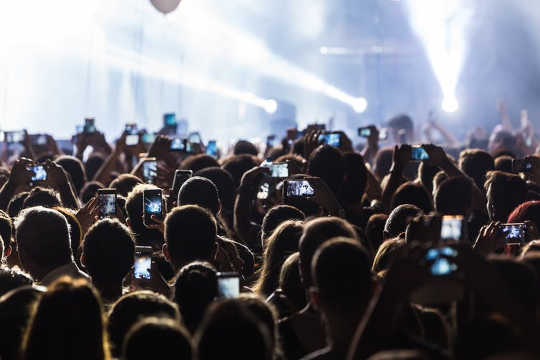
Head in the iCloud? Shutterstock
When I give talks, I am often approached by people who are worried about their memory. Maybe they are studying for an exam and don’t feel that they learn as well as their peers. Maybe they keep forgetting to close the window when they leave the house. Or maybe they struggle to remember an event that happened a few weeks ago but which everyone else can describe in vivid detail.
To feel that your memory may not be up to scratch can be unsettling or even downright frightening. And that’s hardly surprising –- memory makes us who we are. Being able to reflect on and share the past is fundamental to our sense of identity, our relationships, and our capacity to imagine the future.
To lose any part of this ability not only causes problems in our daily routine, it threatens the very notion of who we are. By far the biggest health fear in people over the age of 50 is Alzheimer’s disease and the catastrophic loss of personal memory it entails.
Memory disorders in young people
Are concerns about memory the preserve of the post-retirement generation? It seems not. In fact, if modern trends are anything to go by, younger people are just as nervous of losing access to their past. Go to any big concert these days, and your view of the performer will frequently be obscured by a sea of smartphones, each committing the sights and sounds to a safe permanent digital record.
As far back as cave dwellers, humans have found ways to preserve knowledge and experiences, but has the modern lifestyle taken it a step too far? Could an over-reliance on technology make our memory systems lazier and less efficient?
Some studies have found that using an internet search engine can lead to poorer recall of information, although another study recently published failed to replicate this effect. And most researchers agree that in these situations it is not that memory becomes less effective, just that we use it differently.
How about recording events on a smartphone? A recent study showed that a group pausing to take photos at regular intervals had poorer recall of the event than those who were immersed in the experience. And an earlier piece of research suggested that photos helped people remember what they saw, but reduced their memory of what was said. It seems that the key factor in these situation is attention – actively taking photos may distract and distance someone from aspects of an experience, meaning that less is remembered.
However, there are novel ways around this problem if you insist on taking pictures. Our own work has shown that distraction can be countered if photos are taken automatically using a wearable camera.
Technology and memory
While it may be true that technology is changing the way we use our memory at times, there is no scientific reason to believe that it reduces the inherent capacity of our brains to learn.
Nevertheless, in today’s fast-paced and demanding society, there are other factors that may have a negative impact, for example poor quality sleep, stress, distractions, depression and alcohol consumption. The good news is that these effects are generally regarded as temporary unless they continue over very long periods of time.
There are a small number of people who may experience memory problems over and above everyday forgetfulness. Head injuries, strokes, epilepsy, brain infections such as encephalitis, or congenital conditions such as hydrocephalus, a build up of fluid in the brain, can all lead to a significant loss in our ability to retain and recall information. And recently, a new condition has been identified –- severely deficient autobiographical memory –- which describes a small percentage of the population who report a specific but marked impairment in the ability to recall their past.
These people are the exception though, and most people who worry about their memory have no real cause for concern. When it comes to remembering, we all have our own strengths and weaknesses. The friend who gets top marks in every pub quiz may be the same one who always forgets where they left their wallet. And the partner who can describe last year’s holiday in incredible detail may take forever to learn a new language. In fact, even world memory champions report everyday forgetfulness, like losing their keys.
By and large, where our memory fails us, it is because we are tired, not paying attention, or trying to do too much at once. Using lists, diaries and smartphone reminders does not make memory less efficient – rather, it frees the brain up to do other things. And instead of making us lazy, looking something up on the internet can help to reinforce or enrich our knowledge base.
But there may be occasions when technology gets in the way – by distracting us from a potentially special moment, or luring us into surfing the web instead of getting much-needed sleep. Most everyday memory lapses can be fixed simply by being more mindful and less busy. So, if you want to remember time with friends, my advice is to enjoy the moment, chat about it afterwards and enjoy a good night’s sleep.![]()
About The Author
Catherine Loveday, Neuropsychologist, University of Westminster
This article was originally published on The Conversation. Read the original article.
Book by this Author
at

Thanks for visiting InnerSelf.com, where there are 20,000+ life-altering articles promoting "New Attitudes and New Possibilities." All articles are translated into 30+ languages. Subscribe to InnerSelf Magazine, published weekly, and Marie T Russell's Daily Inspiration. InnerSelf Magazine has been published since 1985.

Thanks for visiting InnerSelf.com, where there are 20,000+ life-altering articles promoting "New Attitudes and New Possibilities." All articles are translated into 30+ languages. Subscribe to InnerSelf Magazine, published weekly, and Marie T Russell's Daily Inspiration. InnerSelf Magazine has been published since 1985.























